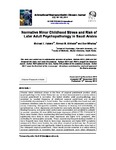Normative Minor Childhood Stress and Risk of Later Adult Psychopathology in Saudi Arabia
| dc.contributor.author | Hyland, Michael | |
| dc.date.accessioned | 2016-01-02T21:39:11Z | |
| dc.date.available | 2016-01-02T21:39:11Z | |
| dc.date.issued | 2014-01-10 | |
| dc.identifier.issn | 2321-7235 | |
| dc.identifier.issn | 2321-7235 | |
| dc.identifier.uri | http://hdl.handle.net/10026.1/4130 | |
| dc.description.abstract |
Chronic minor childhood stress in the form of corporal punishment predicts adult psychopathology in the United States but has not been demonstrated in a country where corporal punishment is normative. We tested whether adult psychopathology was predicted by recalled frequency of childhood corporal punishment and recalled controllability of punishment in Saudi Arabia. Two hundred and fifty nine Saudi men with substance addictions (who for cultural reasons were at risk for depression) completed a survey measuring: demographic variables, frequency of beating and controllability of punishment as a child, depression and borderline personality disorder symptoms (BPD). Beating frequency and punishment control were uncorrelated and unrelated to patients’ or parents’ education. 92 men (36%) had major depression (PHQ-9 ≥15). Compared to those never beaten, those experiencing infrequent beating (once or twice a year) were significantly more likely to have major depression and higher BPD symptoms, after controlling for demographic variables. Those experiencing frequent beating (monthly or more frequent) were more likely to have major depression and higher BDP symptoms compared to those never beaten, but only when perceived control was low. Perceived punishment control was not significantly related to outcome for those who never had or had infrequent corporal punishment. These results provide evidence in a culture where corporal punishment is normative that corporal punishment, even when infrequent, predisposes to adult psychopathology and that uncontrollability increases the pathogenic effect of frequent corporal punishment. These results support the hypothesis that frequent minor stressors in childhood act as kindling factor for later depression. | |
| dc.format.extent | 94-103 | |
| dc.language.iso | en | |
| dc.publisher | Sciencedomain International | |
| dc.title | Normative Minor Childhood Stress and Risk of Later Adult Psychopathology in Saudi Arabia | |
| dc.type | journal-article | |
| plymouth.issue | 2 | |
| plymouth.volume | 2 | |
| plymouth.publication-status | Published online | |
| plymouth.journal | International Neuropsychiatric Disease Journal | |
| dc.identifier.doi | 10.9734/indj/2014/7997 | |
| plymouth.organisational-group | /Plymouth | |
| plymouth.organisational-group | /Plymouth/Faculty of Health | |
| plymouth.organisational-group | /Plymouth/Research Groups | |
| plymouth.organisational-group | /Plymouth/Research Groups/Centre for Brain, Cognition and Behaviour (CBCB) | |
| plymouth.organisational-group | /Plymouth/Research Groups/Centre for Brain, Cognition and Behaviour (CBCB)/Behaviour | |
| plymouth.organisational-group | /Plymouth/Users by role | |
| dcterms.dateAccepted | 2013-12-26 | |
| dc.identifier.eissn | 2321-7235 | |
| dc.rights.embargoperiod | No embargo | |
| rioxxterms.versionofrecord | 10.9734/indj/2014/7997 | |
| rioxxterms.licenseref.uri | http://www.rioxx.net/licenses/all-rights-reserved | |
| rioxxterms.type | Journal Article/Review |


